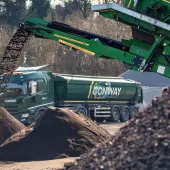Taking a new approach to road recycling
FM Conway explain why the industry needs a ‘Big Data’ moment for ‘greener’ roads
BIG Data is a term that has entered the lexicon. It is used to describe the huge volumes of data generated by traditional business activities and from new sources such as social media.
This data is vast, unstructured and difficult to analyze, but companies are using sophisticated software to identify patterns, trends and insights, which can help them to tailor their services and products to better meet the needs of customers.
‘You won’t be too surprised to learn that Big Data hasn’t got anything to do with highways or road recycling,’ commented David Smith, development director, FM Conway.
‘But I do believe there’s scope for our industry, if it is serious about resource efficiency and recycling asphalt, to have its very own Big Data moment. Essentially, this would see the sector embrace a new approach to recycling; compiling and analyzing data on the composition of our existing roads to develop detailed plans with our customers which allow us to better rework this important and untapped resource.’
A key benefit of asphalt is that it can be 100 % recycled as asphalt, with the aggregate and binder fully re-used. Asphalt recycling remains a largely overlooked opportunity - the UK has a more mature road network and as a rough estimate there could two billion tonnes of asphalt which could be recycled.
Asphalt recycling is important for both environmental and financial considerations. First, recycling the material is the best way of reducing the carbon footprint of roads - embodied carbon in materials constitutes around 40% of the carbon footprint of road construction and maintenance.
Secondly, recycling allows firms to reduce reliance on finite primary aggregates. Thirdly, by recycling asphalt the industry can reduce the volume of bitumen, the binder which remains subject to price volatility and can account for around a third of the total cost of constructing a new road.
‘Over the last decade our industry has undoubtedly taken great strides to normalize road recycling, but our approach is often too sporadic,’ explained Mr Smith. ‘We need to get to the point where a local authority and its term maintenance contractor work in partnership to develop an annual plan for road recycling.
‘This should set out on a street by street basis, the volume and quality of asphalt that will be recycled and where it will be stored before it can be re-used.’
Developing this approach will require greater analysis of the composition of existing roads by using coring techniques. The aim should be to determine the quality, quantity, value and best future use of asphalt planings.
‘We need to be armed with this information because not all road planings are the same,’ continued Mr Smith. ‘They differ in quality and value because they have different original properties – some have high Polished Stone Value (PSV) aggregates, while others are made of limestone or hardstone.’
The best value of materials should also be determined by identifying the additional cost of retaining the original properties of asphalt planings. This will reflect the costs to segregate the planings, transport the materials to a discrete store and the value of the recycled materials versus the cost to store it before it can be re-used on the network.
Many councils already have high targets for the re-use of materials. An annual plan for road recycling would allow them to better benchmark targets and set out the actual scope to cut carbon and recycle highways materials.
Mr Smith concluded: ‘In the future maintenance of roads we must plan the systematic reworking of asphalt to both reduce the need for finite aggregates, cut embodied carbon and also to extend the life of the asset as far as possible.
‘This calls for better planning by contractors and councils and a greater understanding of the quality, composition of planings that can be recycled on a street by street basis. The road to better recycling calls for the highways sector’s very own ‘Big Data’ moment.’









